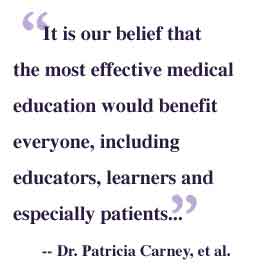
|
For Release: September 1, 2004
Contact: DMS Communications(603) 650-1492
Print Version
Experts Call For National Collaboration on Medical Education Research
HANOVER, NH -- Advocating a stronger scientific foundation for research into medical education, Dartmouth Medical School educators call for a comprehensive network of educational epidemiologists to study teaching in the health professions.
Their report, in the September 1 issue of JAMA, urges a national commitment to collaborate on research that can provide evidence-based standards to assess effectiveness in medical education. Such a commitment, according to the researchers, is critically important as there is currently no evidence basis for the national accrediting bodies for either medical schools or residencies.

The DMS team, led by Dr. Patricia Carney, assistant dean for medical education research, say the principles of epidemiology to study risk factors for disease can also be applied to study educational outcomes. They review models that medical education researchers can borrow from their colleagues who conduct patient care research to illustrate the use of educational epidemiology, which they write, "applies existing scientific methods to educational settings."
Experimental interventional research designs such as the randomized clinical trial pose additional challenges for a medical school curriculum, with its strict accreditation requirements. "In clinical medicine, one of most powerful ways to compare two different treatments which you think are comparable is to assign half the patient subjects to treatment A, half to treatment B, and see which treatment works better," explains coauthor Dr. David Nierenberg, senior associate dean for medical education. "This is harder to do with education research, as students are likely to be reluctant to be assigned to one study group versus another," adds Carney.
While such interventional trials are difficult to do in medical school, other observational strategies used in patient research offer useful models for the medical education setting. These include cross-sectional, longitudinal, cohort and case control studies.
The authors analyze the strengths and weakness of various observational and experimental research methods as a framework for conducting educational research in medicine. They propose that medical schools and residency programs support educational research and cooperate on multi-institutional studies in educational epidemiology that can measure and help improve how medicine is taught. Faculty and students would benefit by learning what types of educational strategies produce learners with the highest level of competency, they say.
"It is our belief that the most effective medical education would benefit everyone, including educators, learners and especially patients, by minimizing costs, reducing medical errors and medical malpractice and maximizing quality of care," the authors write.
Other authors are: Dr. Catherine Pipas, Dr. W. Blair Brooks, Dr. Therese Stukel, and Adam Keller.
-DMS-